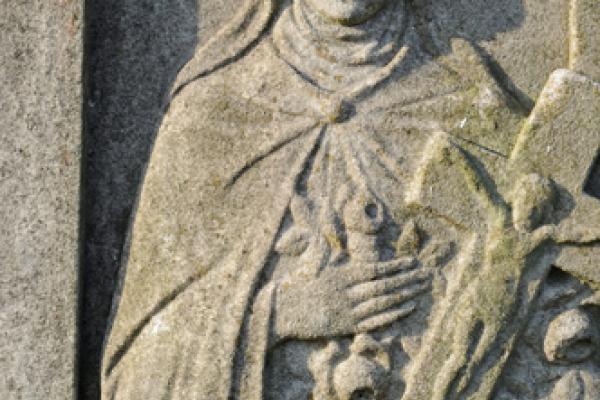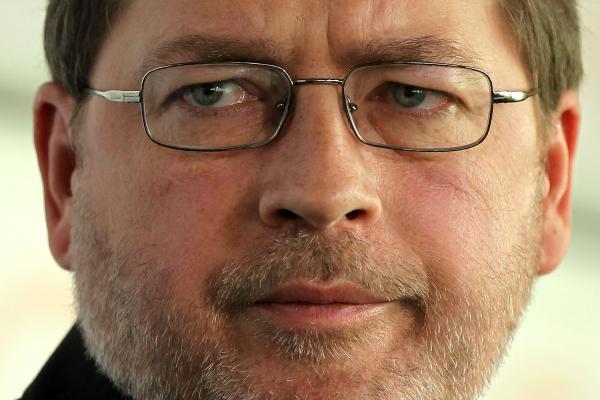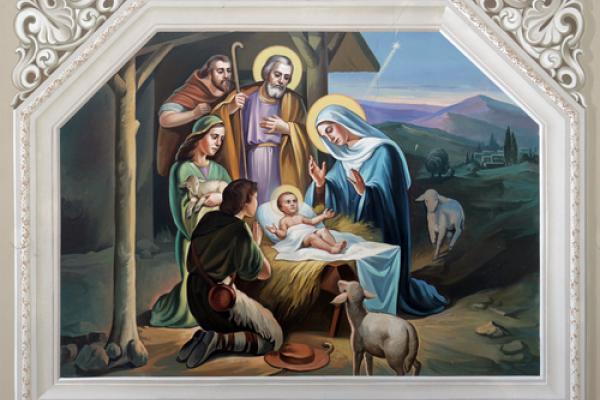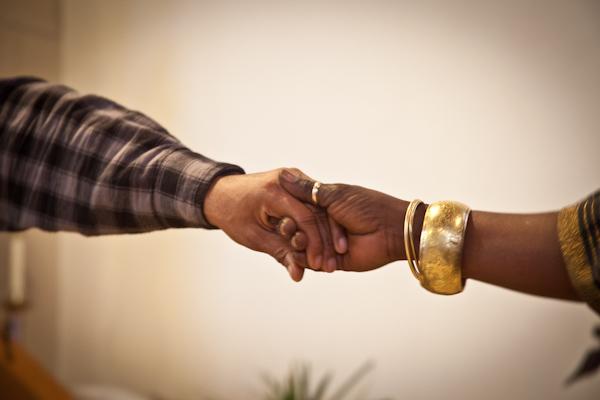Are you put out that a community nativity display was nixed by a city council? Did a checkout clerk greet you with "Happy Holidays" instead of "Merry Christmas"? Maybe Christmas music annoys you when the Advent fast hasn't even arrived?
Not me. I am not compelled to "reclaim" or "rescue" Christmas from the many who ignore and the few who despise its magnificent origins.
How can I be anxious or offended? I am in too much awe of its startling truth: that a baby is God, gasping for air, clasping for mother's milk, flailing his small limbs in a feed trough; taking on my frailty, contingency, vulnerability, that I might partake in his everlasting nature.
The baby is now Lord of all things visible and invisible, forever "one of us," still bearing his now glorified, nail-scarred flesh at the Father's side, making all things new for all persons, hallowing the far-flung cosmos — matter's maker now made matter, redeeming every atom and every stoney heart. This reality overpowers me with its brilliant mystery.
CANTERBURY, England — The Church of England plans to rush through legislation to consecrate women bishops after last week’s surprising defeat at the church's General Synod in London.
The church's Archbishops’ Council ended two days of closed-door meetings on Wednesday (Nov. 28), and said a plan to allow women bishops needs to be "restarted" when General Synod reconvenes in July. Church leaders originally said the issue could not be reopened until 2015.
The 19-member council acts as the standing committee of the three-tier General Synod made up of bishops, clergy and laity.
ST. LOUIS — A federal appeals court on Wednesday temporarily blocked the enforcement of the Obama administration's contraception mandate while a Catholic business owner appeals a lower court's ruling that tossed out his suit.
Opponents of the law said that it was the first time that an appeals court had weighed in on the issue, which has spawned multiple suits across the country, and called it a “significant victory.”
“The order sends a message that the religious beliefs of employers must be respected by the government,” said Francis Manion, senior counsel of the American Center for Law and Justice, one of the lawyers representing Frank O'Brien.
In a two-sentence order issued Wednesday, a three-judge panel of the St. Louis-based 8th U.S. Circuit Court of Appeals voted 2-1 to grant O'Brien's company a delay while the appeal is heard.
Soon after George W. Bush won his first presidential election, Washington lobbyist, Grover Norquist, helped craft the tax cut legislation that would go down in history as “the Bush-era tax cuts.” Among other things, the legislation dropped top marginal tax rates from 39.6 percent to 35 percent and was written to expire on Dec. 31, 2010.
In 2010, Democrats tried to put forward two separate packages of legislation that would extend the cuts, first for earnings up to $250,000, then for earnings up to $1 million. The Democratic-led House passed both bills, but Republican filibuster blocked both in the Senate. President Barack Obama resolved the stalemate by extending all the Bush tax cuts for two more years.
Here’s the irony: Republicans claim to hate deficits, but the facts are clear. If extended indefinitely, the Bush-era tax cuts will account for nearly half of America’s budget deficit by the year 2019.
Ah — I LOVE this time of the year!
Some people wait with bated breath for duck season, some for deer season, but for me it is all about Christmas season. That's right, I'm one of those lefty liberals that have declared a War on Christmas. Yes! Sign me up for the War on Christmas!
But maybe not for the reasons you might imagine.
While I am signing up to help in a War on Christmas, I'm not on, what by default gets called, the “non-Christian” side. I’m also not signing up for the side that news pundits falsely purport as the “Christian” side. If anything, I’d make the argument that the dominant face of Christianity, as it is seen on television and promoted through news programming, is itself far from what Christianity is supposed to be. It is a sort-of white-washed, sanitized version of Christianity that every year presents an increasingly cleaned up version of the Christmas story to the viewing public.
WASHINGTON — As a coalition of mostly Christian groups gathered here Thursday to support church leaders who have publicly questioned U.S. aid to Israel, those same church leaders signaled that they want to reconcile with the Jewish groups who were upset by their action.
An Oct. 5 letter asking Congress to investigate U.S. aid to Israel led Jewish groups to cancel a long-planned meeting later that month of the Christian-Jewish Roundtable, a eight-year-old group dedicated to improving relations between the two faiths.
The Rev. Gradye Parsons, the top official of the Presbyterian Church (USA) and the first signatory on the letter, did not attend Thursday's Washington press conference that was convened to support its message. But Parsons said he stands by the letter, and acknowledged that it heightened tensions between Jews and Christians on the roundtable.
“We regret any distancing it put between us and our Jewish partners," he said, "and we hope we can close that gap."
After November’s presidential vote, Catholics could cite ample evidence for their renewed political relevance while dispirited evangelicals were left wondering if they are destined to be yesterday’s election news. Yet their roles in American spiritual life may be reversed.
New research shows that Catholics now report the lowest proportion of "strongly affiliated" followers among major American religious traditions, while the data indicates that evangelicals are increasingly devout and committed to their faith.
According to Philip Schwadel, a sociologist at the University of Nebraska-Lincoln, in the 1970s there was only a five-point difference between how strongly Catholics and evangelicals felt about their religion.
By 2010, he said, that “intensity gap” had grown to around 20 points, with some 56 percent of evangelicals describing themselves as “strongly affiliated” with their religion compared with 35 percent of Catholics. Even mainline Protestants reported a higher level of religious intensity than Catholics, at 39 percent.





